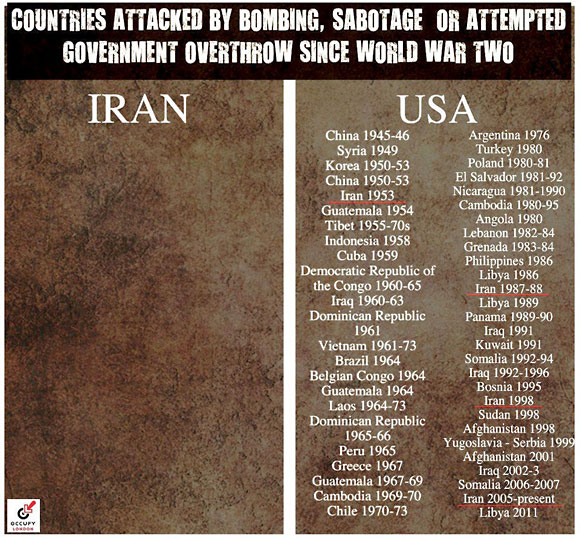“Iran Hasn’t Invaded Another Country In More Than 300 Years.”
– George Galloway: The Case Against War With Iran (Must-Listen!!!)
– Economic Warfare: Iran Signals Currency Devaluation (Infowars, Aug 7, 2012):
Economic warfare against Iran is beginning to have an effect. On Monday, Iran’s rial dropped around 5 percent against the dollar as Iran’s central bank announced further currency devaluation that will begin in ten days. In January, the country announced an 8 percent devaluation of the rial to 12,260 against the dollar. The rial has weathered a dramatic devaluation since the beginning of the year.
The move is another sign that sanctions imposed on Iran allegedly in response to its nuclear program are beginning to take a toll. Iran is cut off from the international banking system and the rial has lost around half its value against the dollar on the so-called free market.
The IMF admits the sanctions are designed to break the country and force it to run up an external deficit. The bankster loan sharking operation predicts Iran’s crude oil exports will dwindle to 2.0 million barrels per day this year from 2.5 million last year. Pressure applied by the sanctions will result in a current account surplus drop from 10.7 percent of gross domestic product to 6.6 percent.
Currency devaluation will undoubtedly feed inflation. Prices on consumer goods have risen at annual rates above 20 percent.
In July, the head of Iran’s Presidential Center for International Legal Affairs, Majid Jafarzadeh, said the government of Iran will take legal action against the United States and the European Union for imposing sanctions outside of the framework of the United Nations Security Council.
“The sanctions in the area of health and similar fields are a violation of human rights, and can be legally pursued,” Seyyed Hossein Naqavi Hosseini told Press TV.
The collapse of Iran’s currency and government commodity subsidy cuts have resulted in steep price hikes. The price of gasoline has risen three-fold and the cost of gas has skyrocketed by 500 percent.
“The sanctions placed on the Iranian economy have ushered in runaway inflation, cuts in government subsidies, and high unemployment. The supposed purpose behind the economic warfare is to pressure Iran away from developing nuclear weapons, even though Washington admits Iran has no weapons program and has not made the decision to start one,” John Glaser wrote on July 23.
Mahmoud Bahmani, the governor of the Central Bank of Iran, said in July that economic sanctions are designed to destroy the country’s economy and represent a declaration of war.
Rep. Ron Paul has characterized the sanctions as “an act of war.” He dismissed the as of yet conclusively proven accusation that Iran is developing nuclear weapons. “The IAEA and our CIA said they are not on the verge of a nuclear weapon. It is so similar to what we went through in the early part of this last decade, when we were beating the war drums to go to war against Iraq. And it was all a façade. There was no danger from Iraq,” he said last week.
The United States has waged economic war against Iran since the late 1970s. In 1983, under Reagan, the U.S. accused Iran of sponsoring terrorism and opposed international loans to the country. It imposed embargoes against Iranian imports and the sale of so-called “dual use” item.
“Washington has long been making unflagging efforts to push Iran to the farthest margins of political and economic isolation even when Iran was not working on its nuclear energy program,” writes Dr. Ismail Salami.
In addition to economic sanctions, the U.S. and Israel have increased their saber-rattling. In response, Iran has indicated it is preparing for a military attack “within weeks,” according to a report issued by Israeli intelligence asset DEBKAfile.
The comment was allegedly made on July 27 before Friday prayers by Iran’s supreme leader Ayatollah Ali Khamenei.
“Despite more substantive reports speculating that any decision to attack Iran on behalf of Israel had been delayed until spring 2013, a parallel narrative that a military strike could take place in September or October has been doing the rounds more recently,” Paul Joseph Watson wrote on August 1.
